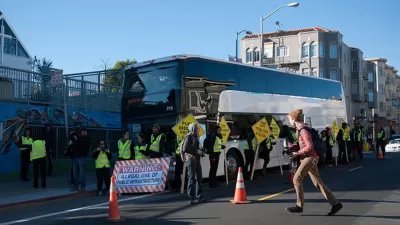Yes—that's right: fervent opponents of Google (et.al) buses tried to use California's environmental law to get them off the streets of San Francisco—which would lead to tech employees driving their own vehicles to Silicon Valley.
"The appeal, which opponents filed in February, said the city did not properly examine and evaluate potential environmental impacts to the city from the buses, which carry employees from San Francisco to tech campuses on the Peninsula," writes Ellen Huet on the legendary clash between the city's tech community and gentrification opponents centered on the iconic buses.
The use of the landmark, 1970 environmental law brought a new twist to the controversy as opponents have been widely known for taking their opposition to the streets (also see "Gmuni dancers" blocking a Google Bus in admirable formation clad in appropriate Chrome colors).
On Tuesday, April 01, the Board of Supervisors voted 8-2 to reject the appeal after more than six hours of debate. See page 10 of agenda [PDF] and Joshua Sabatini's excellent recount of the meeting in The Examiner.
CEQA was used by opponents to delay the Board of Supervisors' approval of the pilot shuttle bus program, whereby the private shuttles would pay a fee for access to MUNI bus stops for 18 months commencing July, in a similar vein that a small group of bicycle opponents successfully used CEQA in 2006 to stall the approval of the city's bicycle plan for five years. It remains to be seen if Richard Drury, the lawyer representing the appellants, takes the appeal to court.
Environmentalists and union representatives said the city planning department should not have exempted the program from reviews under the California Environmental Quality Act. They say environmental effects - which could include damage to roads, traffic congestion, emissions and resident displacement in neighborhoods near stops - were not studied before the bus program was allowed to begin.
Proponents of the buses say they keep thousands of cars off the road and that the program will help the city regulate them. One oft-cited UC Berkeley study that surveyed 130 regional shuttle riders showed almost half would drive to work alone from San Francisco if they couldn't ride a bus.
Last week The Examiner reported on a survey commissioned by the Bay Area Council, a major shuttle booster, showing wide support for the private shuttles, often referred to as Google Buses though the pilot program also applies to intra-city shuttles such as those used by University of California at San Francisco. The 'tech shuttles' are considerably larger than those used by UCSF.
A poll of 500 likely voters in San Francisco found 79 percent of participants believed tech’s growth has been good for The City, though activists criticize the industry for displacing longtime residents.
Last word goes to Sarah Jones, director of environmental planning at the planning department. "We do very much understand that the shuttles are creating inconveniences for Muni riders. These inconveniences do not rise to such a level that doing a review for the shuttles is necessary."
FULL STORY: Appeal targeting S.F. tech shuttles shot down

Alabama: Trump Terminates Settlements for Black Communities Harmed By Raw Sewage
Trump deemed the landmark civil rights agreement “illegal DEI and environmental justice policy.”

Study: Maui’s Plan to Convert Vacation Rentals to Long-Term Housing Could Cause Nearly $1 Billion Economic Loss
The plan would reduce visitor accommodation by 25% resulting in 1,900 jobs lost.

Planetizen Federal Action Tracker
A weekly monitor of how Trump’s orders and actions are impacting planners and planning in America.

Wind Energy on the Rise Despite Federal Policy Reversal
The Trump administration is revoking federal support for renewable energy, but demand for new projects continues unabated.

Passengers Flock to Caltrain After Electrification
The new electric trains are running faster and more reliably, leading to strong ridership growth on the Bay Area rail system.

Texas Churches Rally Behind ‘Yes in God’s Back Yard’ Legislation
Religious leaders want the state to reduce zoning regulations to streamline leasing church-owned land to housing developers.
Urban Design for Planners 1: Software Tools
This six-course series explores essential urban design concepts using open source software and equips planners with the tools they need to participate fully in the urban design process.
Planning for Universal Design
Learn the tools for implementing Universal Design in planning regulations.
Caltrans
Smith Gee Studio
Institute for Housing and Urban Development Studies (IHS)
City of Grandview
Harvard GSD Executive Education
Toledo-Lucas County Plan Commissions
Salt Lake City
NYU Wagner Graduate School of Public Service



























